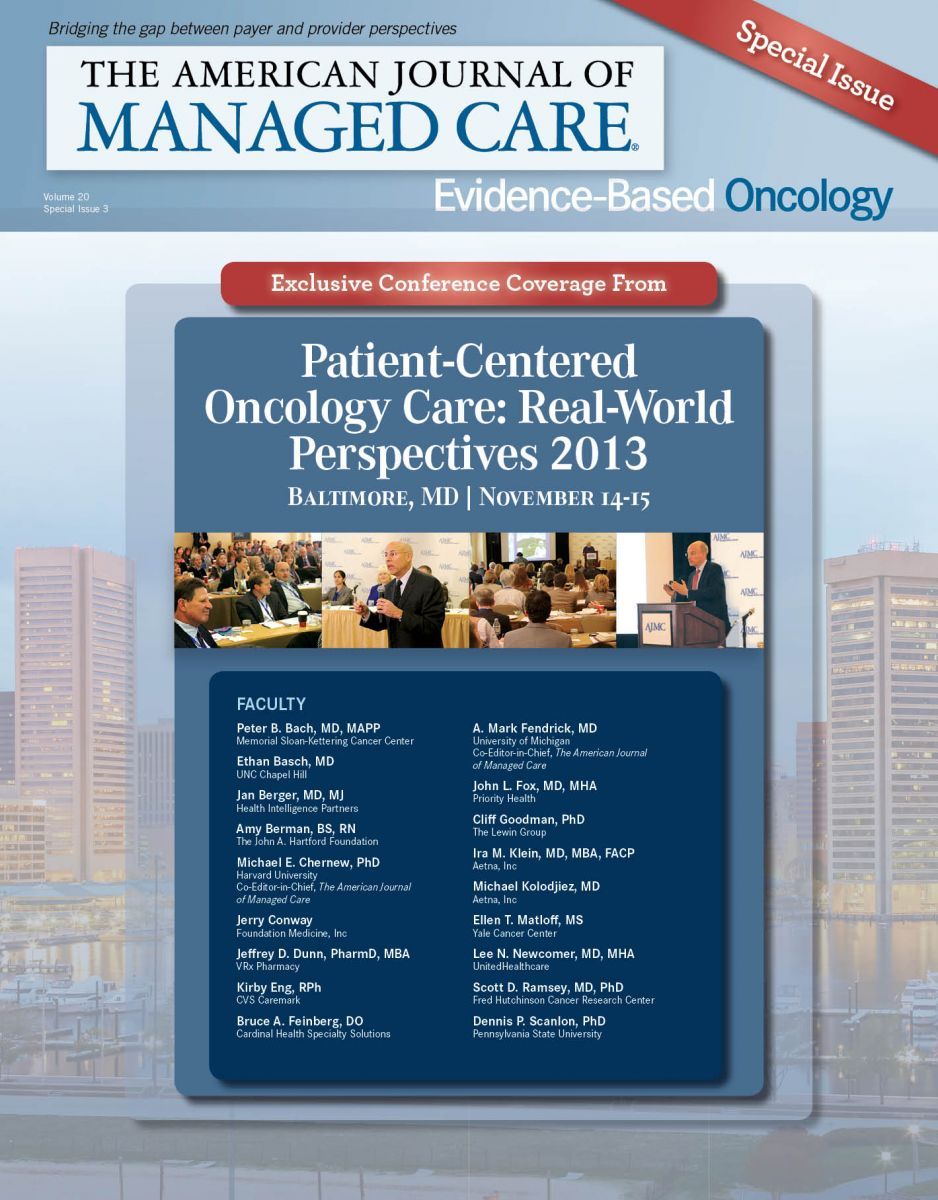- Center on Health Equity & Access
- Clinical
- Health Care Cost
- Health Care Delivery
- Insurance
- Policy
- Technology
- Value-Based Care
With Data, Access and Sharing Are Keys to Improving Quality
Lee N. Newcomer, MD, MHA, joined the response panel, Challenges and Opportunities for Quality Measures in Oncology.
Following his talk, Lee N. Newcomer, MD, MHA, joined the response panel, “Challenges and Opportunities for Quality Measures in Oncology,” which included Phyllis Torda, vice president, Quality Solutions Group, the National Committee for Quality Assurance; and Dennis Scanlon, PhD, professor of health policy and administration at Penn State University. Ira M. Klein, MD, MBA, FACP, chief of staff, Office of the Chief Medical Officer, Aetna, Inc, led the discussion.
Unlike the famous song, time is not on the side of payers who seek data to improve healthcare.
Time is what Lee N. Newcomer, MD, MHA, senior vice president for Oncology, Genetics and Women’s Health at UnitedHealthcare, described as his greatest hurdle in using numbers to drive improvements in cancer care delivery. Data collection takes too long, and then more time is needed to make sense of it before payers can use the findings.
Ira M. Klein, MD, MBA, FACP, who led the panel discussion after Newcomer’s talk, asked each person to describe the biggest challenge to using data successfully. Like Newcomer, Klein represents a large payer, and he said that Newcomer had “understated” the challenges of deploying data in the cause of quality improvement. Klein wanted to know how Phyllis Torda, of the National Committee for Quality Assurance (NCQA), viewed Newcomer’s assessment that data could be less than perfect but still useful in promoting quality care.
Torda, whose role for NCQA includes promoting use of electronic health records (EHRs), seemed to disagree with Newcomer when she listed “standardized data” as her greatest challenge. But
then she drew a distinction between the database Newcomer had described for use within a health plan and data gathered for external uses.
“I totally agree with the value of the quality improvement process that (was) described.... Every practice should have that process in place,” Torda said. “Definitely, the bar gets higher when you get to data for accountability, data that’s going to be publicly reported. It is definitely a balancing act between precision and getting something out there, and the small numbers issue plays into that.
“You really have to figure out where you need that precision and where it’s really not going to make that big of a difference, but it does take time to do that,” she said.
Newcomer said the key to making providers comfortable with sharing numbers and discussing performance is to separate the quality improvement process from the one used for accreditation or payment. When United-Healthcare initially shared information with cancer care providers on how they rated against measures from the National Comprehensive Cancer Network, reaction was harsh. But that changed when UnitedHealthcare presented the caveat that “There is no blame here—zero. All we are doing, if we find a gap; it’s an opportunity.”
Then there’s the problem of bad data, or data that are incomplete, such as the example Scanlon described—getting a set of claims data without complete clinical information. That’s why Scanlon finds it so essential to collaborate with payers or groups like NCQA; data can be culled from different sources and combined to yield the most complete picture. “When you can combine (tumor) registry information with the claims data, it’s powerful; a lot of questions can be answered,” Scanlon said.
Torda said this is why EHR collection must be improved. “What we are beginning to get out of EHRs is not adequate to support quality measurement, or even quality improvement,” she said. “Too much information is not in structured fields; the structured fields need to be defined, they need to be present.”
EBO
Newcomer agreed, as this will allow providers to review results from multiple payers—including, soon, the Centers for Medicare & Medicaid Services. “People recognize that it’ll be valuable information, and there are already discussions going on about how can we collaborate in a way that isn’t going to violate anti-trust, but will push the quality agenda.”

Quality of Life: The Pending Outcome in Idiopathic Pulmonary Fibrosis
February 6th 2026Because evidence gaps in idiopathic pulmonary fibrosis research hinder demonstration of antifibrotic therapies’ impact on patient quality of life (QOL), integrating validated health-related QOL measures into trials is urgently needed.
Read More
Building Trust: Public Priorities for Health Care AI Labeling
January 27th 2026A Michigan-based deliberative study found strong public support for patient-informed artificial intelligence (AI) labeling in health care, emphasizing transparency, privacy, equity, and safety to build trust.
Read More
Ambient AI Tool Adoption in US Hospitals and Associated Factors
January 27th 2026Nearly two-thirds of hospitals using Epic have adopted ambient artificial intelligence (AI), with higher uptake among larger, not-for-profit hospitals and those with higher workload and stronger financial performance.
Read More
Motivating and Enabling Factors Supporting Targeted Improvements to Hospital-SNF Transitions
January 26th 2026Skilled nursing facilities (SNFs) with a high volume of referred patients with Alzheimer disease and related dementias may work harder to manage care transitions with less availability of resources that enable high-quality handoffs.
Read More

